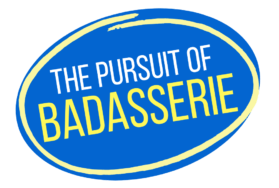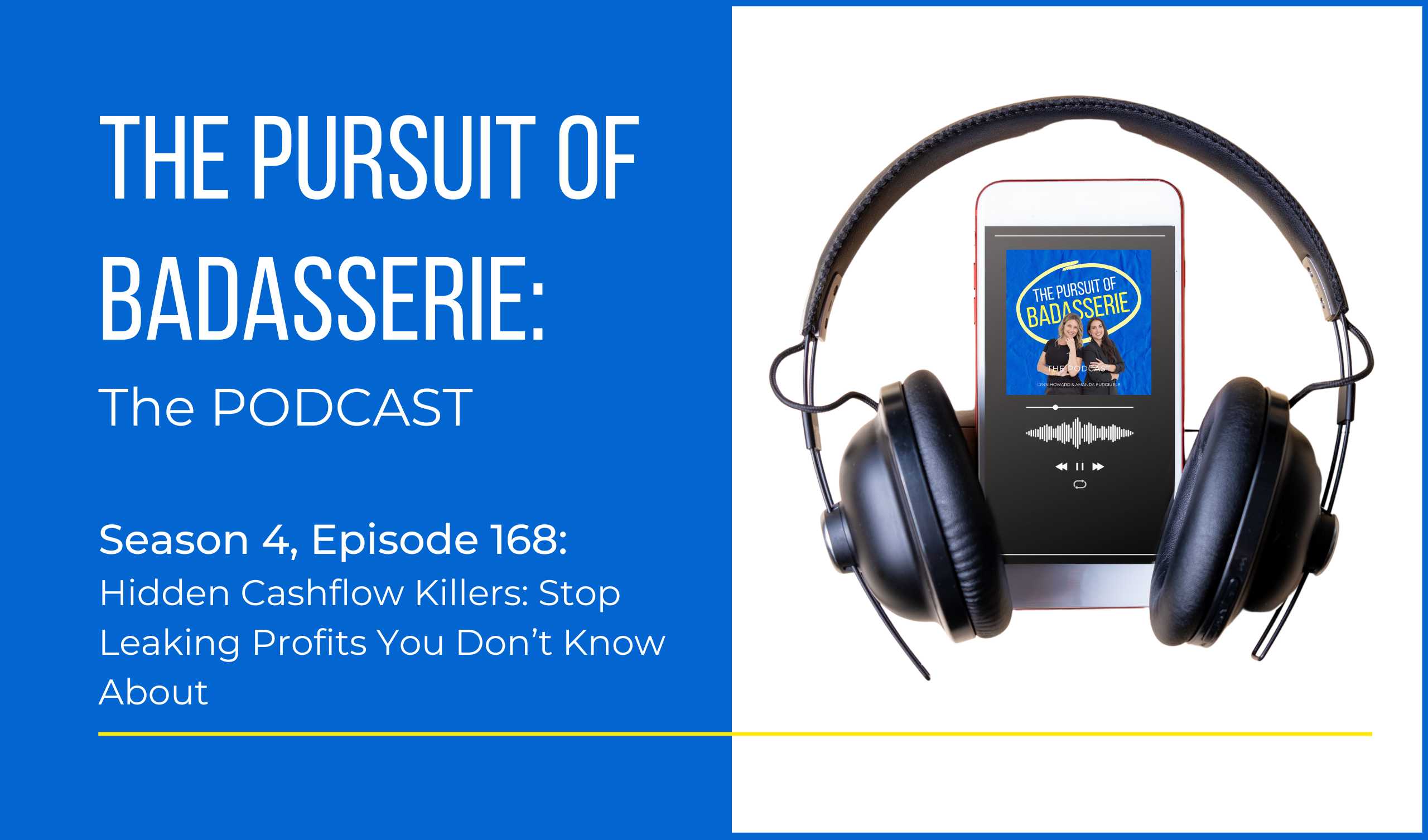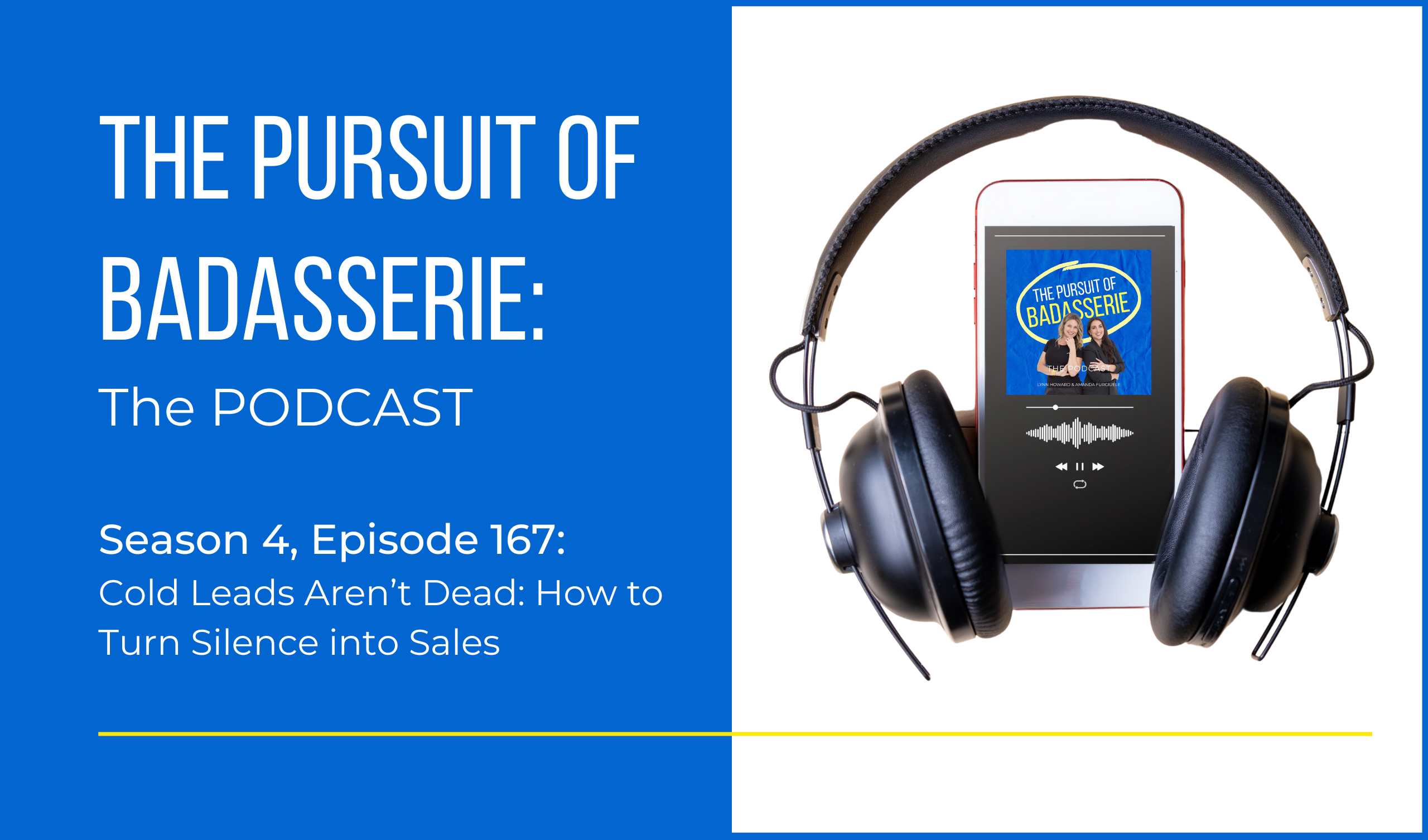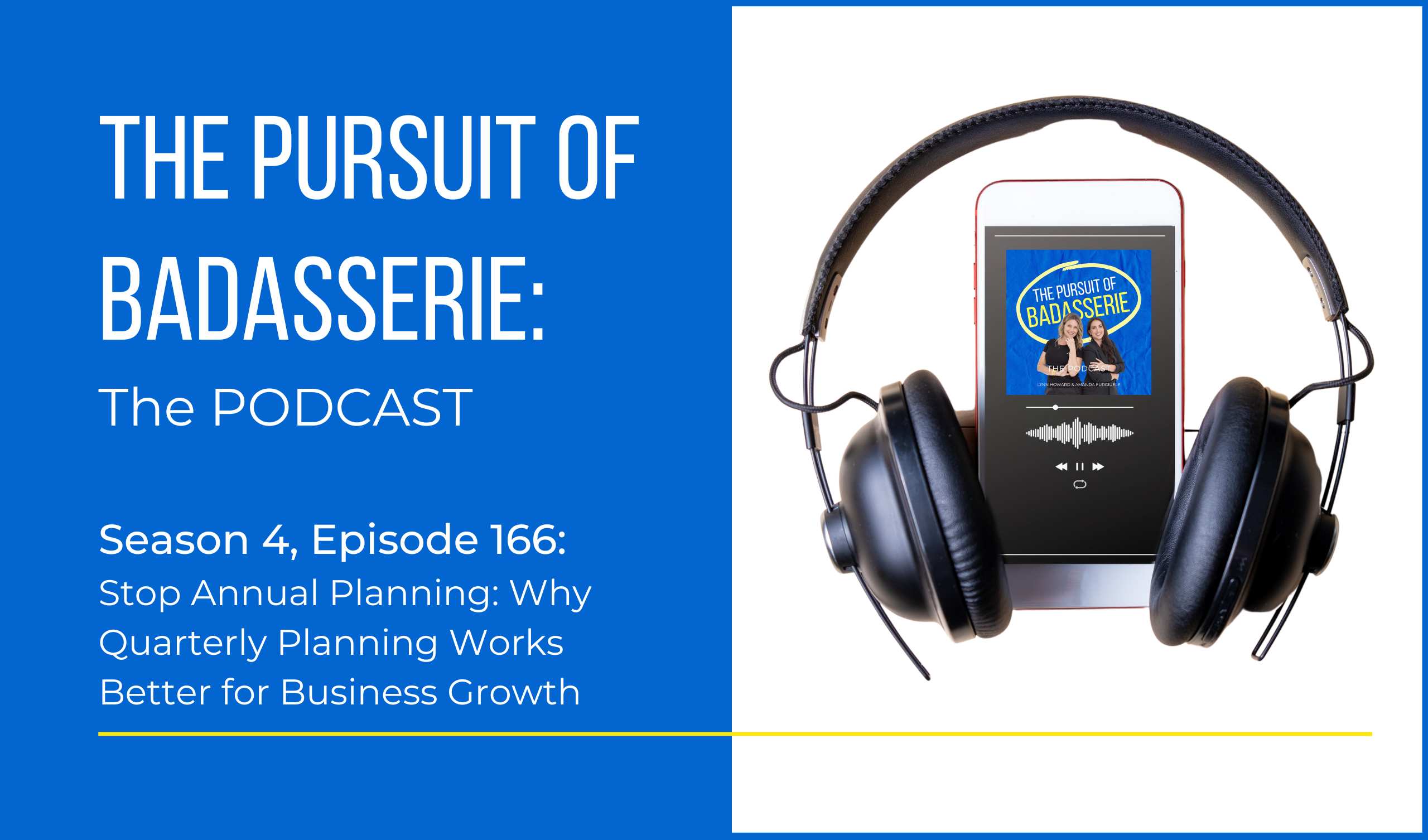Episode 148: Profit with Purpose: The Power of Social Entrepreneurship
We didn’t start our businesses just to make money—we started them to make a difference. In this episode, we’re diving deep into what it means to run a business that not only profits but also serves a bigger purpose.
Social entrepreneurship isn’t reserved for massive nonprofits or global movements. It’s something we can embody as everyday business owners—especially when we’re rooted in our communities, building something real, and choosing impact over ego.
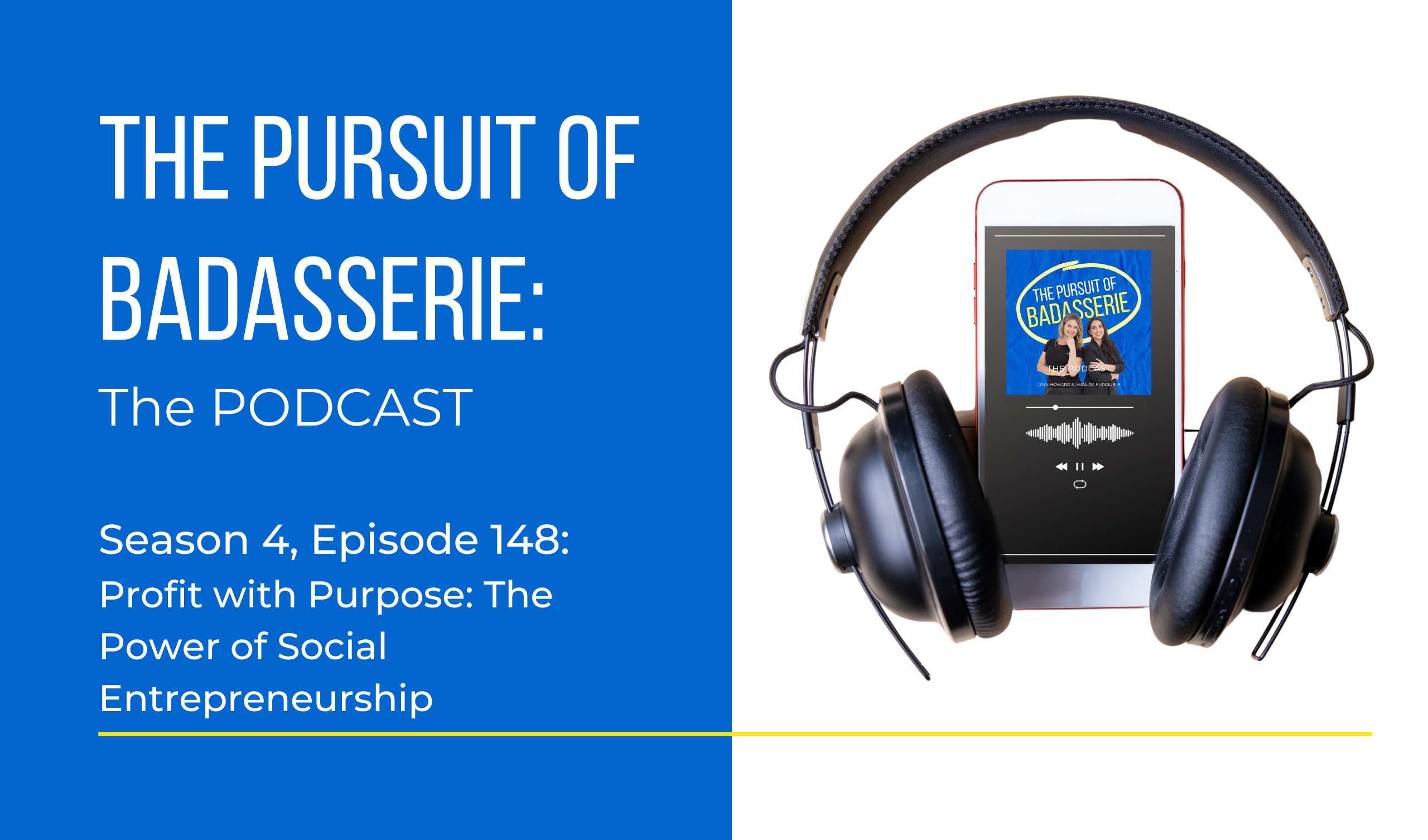
We’re sharing:
-
The real definition of social entrepreneurship (and why it matters now more than ever)
-
How we’ve built community impact into our business models—intentionally
-
The myths around giving back, visibility, and “selling out”
-
Why creating a mission-driven business helps you stand out and scale with integrity
If you’re ready to lead with purpose and still grow with strategy, this episode is your permission slip to do both—and do them well.
Let’s build businesses that actually change lives—ours and others’.
Listen in and let’s rise together.
Make sure to subscribe to our YouTube or Spotify and leave us a review!
- Like the show? LEAVE US A REVIEW wherever you listen!
- Have a question? CONTACT US at info@thepursuitofbadasserie.com!
- Want to sponsor us? Find out how HERE.
…
Read the full transcript of this episode below:
Hey, I’m Lynn.
Amanda Furgiuele (afconsultingteam21@gmail.com)
And I’m Amanda. Welcome to the Pursuit of… We’re back again, and we’re talking about trust, how you build it, what a trust-first business looks like.
Let’s get trustworthy in this episode.
Lynn Howard
Get down with the trust. Yeah, I used to work, have a franchise with, we won’t say the company name, and we taught the referral steps.
We often, I mean, the first step was trust. It was the biggest because it’s the hardest to build and the easiest to lose, and I think nowadays we don’t spend enough time building that trust, continuing, and even after we get the sale with, like, clients or even the no, we stop building trust.
It’s like we’re only doing it to convert, and that’s not a good thing. So definitely trust is uber important in all aspects of your business and in your relationship.
And it’s not a one time thing. So, and it always needs to be worked on.
Amanda Furgiuele (afconsultingteam21@gmail.com)
Always. It does. You know, the thing that’s hardest about trust from a business perspective, but also from your personal life.
Once you lose trust, it’s really hard to gain it back. Period. So when you think about from a business perspective, what does that look like?
Is this, you know, is it trusting from a customer service perspective? Is it trusting from a sales perspective? But ultimately, it matters in a lot of different ways.
this is trust is what’s going to close your sales faster. It’s going to reduce all that churn and like resales.
It’s going to drive more organic referrals, allow for higher pricing in a lot of cases. Like if people trust your brand, they’re more likely to spend more on it than if they don’t trust your brand.
mean, think about like Louis Vuitton or Bentley or, you know, a Birkin bag. They, people are more willing. And yes, those are luxury brands, but they’re more willing to spend.
They didn’t get to the luxury status unless they had trust behind them. That’s part of the whole, the idea of the luxury band is that you know you can trust that what you’re going to get from them is quality.
That’s part of what the brand stands for. So when you’re thinking of building trust in your business, it’s a lot more important than just, you know, saving face or being likable in the world because it really does make every part of your business run smoother.
And you can even make your clients like you or forgive you faster. If something ever does happen, if there is an occasion.
Yeah, they see you as human and they, and they, well, they trust you. So they have a, they’re more likely to forgive you when you make mistakes, which are always going to happen, no matter what kind of business you have.
Lynn Howard
Yes. Yeah. Trust isn’t a one time thing. I mean, we’re going to say that probably a kajillion times in this short little podcast.
But it is not a one time thing. It is an ever. Revolving, built upon it type of thing. And everything that you do or don’t do, so every action and inaction, anything put out there is either building some kind of trust or not.
And so one way I’ve always described it is it’s either planting little green flags, so green means go, or little red flags.
And the more red flags that you have, even on a subliminal level or unconscious level, with the prospect or with your client, that’s just like chipping away at their belief in you, at their consideration of you, at their wanting to interact with you and purchase with you and stay your client, all of those good things.
So, so looking at your whole, this is also why Amanda and I talk so much about systems. classroom, story.
there’s the at and And processes because and looking at the big picture reverse engineering it down because it gives us the ability to make sure that we’re staying consistent with the tonality with the voice of trust and building that trust because there’s so many different things that you can do on and offline to build trust and we’ll get into some of those and yes, you can build trust via a zoom call.
I hate when people say that you cannot you absolutely can but obviously being in person gives you a different kind of like energy but you see in the big picture understanding your processes and system it allows you to hopefully embed things that are going to continue to build that build that trust factor because remember there’s no like trust right so they can know you they can like you but that trust is the last thing to come because it’s the hardest to build and it’s easiest to lose.
Amanda Furgiuele (afconsultingteam21@gmail.com)
Absolutely. And yeah. It’s funny that you talk about Zoom calls because I feel like Zoom is so everywhere now.
mean, who doesn’t trust? I’m not saying that there aren’t ways to suck at Zoom as well, but that’s an easier way to build trust.
And a lot of the online trust building tactics are harder because there is no personal attention. Whereas a Zoom call, at least there is some interface happening where you have dialogue and it’s a bit easier to build trust.
But from an online perspective, I mean, think about social media and how you build trust as a brand on social media, even if you are an online company only.
Maybe you don’t have a brick and mortar. Maybe you never see a person really in person. There are still plenty of online brands that create trust in their social media, in their marketing, in all facets of their business, even though there is no personal one-on-one attention for the most part.
Lynn Howard
Yeah. mean, consistency is one thing that is super key. you. to help with building that regardless if it’s on or offline.
But I would also add transparency. Before we start getting into ways to build trust on and offline, I think having transparency of some kind of layer, right?
Some kind of version of transparency. Some people will be more transparent than others. Some companies will be more transparent than others.
That has to do with who they are as people, who they are, whatever. Because you can also show transparency without giving everything away.
There’s an art to being transparent, right? Even just saying, I feel this too, or I’ve went through this too.
That’s definitely being the transparent side. So consistency and transparency, again, both on and offline are super important.
Amanda Furgiuele (afconsultingteam21@gmail.com)
Thank Yeah, I mean, trust, think about the people you trust most in your life. mean, think about from a more personal standpoint, who are the people you trust most in your life?
Why? Why do you trust them? Where does that stem from? How, you know, a lot of people might say they’re parents, but think of all the people who don’t have relationships with their parents and who, like, how did that get to the point where you don’t have a relationship?
What trust was broken? What things happened? What were the events that took place? It usually isn’t just one thing.
It’s usually small things along the way, and then usually several big things as well. But no matter how you think about trust from a business perspective, it’s going to be a lot of small things and maybe a few big things, but it’s things that add on one another.
It usually isn’t just an instantaneous, I don’t like this business, I don’t trust them. And if that is their initial feeling, then they’re not your target audience.
So if there is. If they immediately think, I don’t know you, I don’t like you, don’t trust you, then they’re probably just not your target audience.
But as Lynn said, the trust part is the hardest to build. And so when it comes to your business online or offline, you’ve got to be consistent.
You’ve got to be clear. You’ve got to be transparent across multiple facets. And it doesn’t mean you have to give everything away and be overly sharing everything.
It just means that you have to be open in that way and consistent across all platforms and interactions.
Lynn Howard
Yeah. And yeah, so let’s get into some online and then some offline ways that you can build trust. So I know this might be an interesting one, but speaking of Zoom, it’s like show your face, put your camera on.
And listen, with social media, I’m not saying that always, because I’ve seen the faceless accounts and they do really well, but not all of them do.
The ones with face. Faces typically do better anyway in majority or percentage wise than the faceless one. So showing your face, showing that you’re a real person, not some generated, you know, Millie, Millie Vanilli behind the scenes.
For those of you who don’t know who Millie Vanilli is, who is another one who is totally, I’m going have that song in my mind.
What’s the first song that you think of when you think of Millie Vanilli?
Amanda Furgiuele (afconsultingteam21@gmail.com)
I don’t I’m just going to start singing it. No, we’re not getting off on Millie Vanilli tangent. I showing your face and showing that you’re a real person, turn on your camera.
Lynn Howard
When you go to Zoom meetings or networking, like we belong to a couple of virtual networking groups and all the time people are turning off their cameras for different events or different meetings.
No, turn it on for more than one reason, but it helps build instant trust. Nothing. Nothing. But it’s a green flag towards stress.
Amanda Furgiuele (afconsultingteam21@gmail.com)
Absolutely. I mean, we all know the horror stories of the Zoom calls gone bad when you thought your camera was on and it wasn’t or it was.
We all know the stories. But in the case of building relationships for your business, be mindful of what’s going on.
Show up ready to go. Don’t show up half on your phone. You’re in transit. You’re cooking dinner at the same time.
So, again, you’re showing invited attention. But from an online offline perspective, so some of the things that you can really that are tactics you can use to build offline and online.
So, again, we already said that be consistent, be clear, be transparent. This includes your pricing, your policies, your, you know, how you started, how you got together, like some of that behind the scenes humanizing stuff that, again, should be more transparent.
You know, using testimonials, using case studies, that stuff always builds trust or helps to build social. And, you know, even something as simple as nurture sequences, like starting your email sequence, if you have a newsletter, or if you have an email, you know, system that you use, which you should, in some capacity, use email marketing, it’s not always going to be a sale, it’s not always going to be, sometimes it’s a policy change, sometimes it’s a behind the scenes, or how we got started, or, you know, this is our mission statement.
So there are lots of ways that people build trust even through email marketing, that aren’t always salesy. And this is kind of like show the process, not just the service of the product.
And then from an offline perspective, so like hosting events, being in the community, being out there in the community, being speaking on a stage, getting out there, you know, shaking hands, networking, and throwing yourself out in the community can be a great way.
To build trust and to get your name out there in a way that is authentic. And ideally, you’re showing up at events that are relevant to your profession as well.
But then we said like systems, respecting people’s time, saying no when it’s not a good fit, rather than trying to make it fit, and then it not really quite working out.
Because again, that’s, you know, red flags in that capacity. And we’ve talked about that a lot when you come to like finding your ideal clients.
And just because somebody’s throwing money at you doesn’t mean you’re the right, the right choice. So I had somebody who reached out to me, looking for marketing help, and I can help with marketing.
But what they really wanted was like a whole branding overhaul, they wanted to read you everything. And that’s, yes, I could help with that.
But I would rather hand it off to a better fit. Because that in and of itself, will plant that green flag for me as a business consultant.
So later when they want something else, they’re like, Oh, she didn’t screw us over, she gave us a really great referral sheet.
We did this, so then it builds trust in me as an authority or as an expert in my field, just in that one way.
you’re connected. Yeah, you’re connected and that you’re not just taking their money to take their money.
Lynn Howard
Correct. I mean, yeah, when I owned the alarm company, for those of you who don’t know, owned an alarm company back in Hawaii many, many years ago.
And my biggest strategic alliance was my competitor. And we spoke highly of each other. And we would pass business back and forth.
We would say, you know what? I would say, if you don’t go with me, please go with Tim. Or tell them, I’m not the right fit.
Tim’s the right fit for you. And people would remember that. Like, it really sat with them, especially in a tight-knit community like Hawaii.
So I agree with you, all the things that you said. Some more that I would add, since you went on an ADHD moment and kind of, like, gave me a gajillion.
I love it. Because there’s… So many different ways that we can like build trust. So pick a couple, we’re going to give you a bunch, but pick a couple and work on them and then pick, come back to the podcast, pick a couple more and work on them.
Maybe we should do a PDF. So we already kind of talked about it, about like sharing your, your, your wins and your mistakes openly.
I think that that’s really important. So that way you can show them that you’re human online, returning DMs and comments, like responding, but not just being in there as a shark, trying to only what’s in it for me, but also commenting on other people’s stuff, like truly like reading their, their content and commenting on it, um, deliver consistent on branding messages, um, or messaging, like make sure that you’re saying on brand that doesn’t always, especially today, like people are so creative, like there’s mix and match color schemes and different things like.
As long as it is you and the flow that it goes, I’m still old school. I like a one color palette or like one kind of color branding, if you would, or grouping, but not changing it to have 15 different colors.
Personally, I know Amanda’s like this as well. Doesn’t mean that we might not change our colors later. Like since I’ve been a consultant, I’ve changed mine a couple of times as I, as I grow and evolve.
Um, but having that, that consistency in your branding is really important. Um, one thing, and I know we can go down a rabbit hole with this one too, but it’s the educating of your off, your audience on or offline with content that’s relevant to them, but also offering value before the ask.
And I think that that is coming into something to give before you get right. And. Amanda and I, we met in B&I.
It’s giver’s game. We definitely believe in that. But even more so, it’s important. It helps build trust. Now, there’s the dark side of that, where you give too much and not asking or not taking or receiving, but definitely give value.
Amanda Furgiuele (afconsultingteam21@gmail.com)
And I think that the dark side of giving value, as Lynn said, is this giving so much value, but never actually asking for a sale or being taken advantage of.
And again, you’re building trust. There’s going to be people, there’s always going to be people who take advantage of it.
That’s just part of life. And you have to decide, you know, if you’re, if you’re staying really true to your, to your offer, to your, you know, your consistent brand, all those things that will kind of fall away.
So it’s, I mean. You You You Keep yourself on point and don’t go crazy with it, but it will self-regulate in a lot of ways.
So when it comes to thinking about your business and the trust factor, I think we both want to know, where do you feel your business falls in this know-like trust?
Do you feel like you’re making an actual effort to build trust in your business, or is it one of those things that you’re just like, well, people trust me.
You kind of assume that it’s happening, which I see a lot in smaller businesses, they just assume that people will trust them because, oh, I live in a small town, or I’m a small business, or I have this many followers, maybe it’s 100,000, or it’s only 10, and people will just make great, grandiose assumptions about the know-like trust factor.
So I want to know when it comes to your business, where do you feel like you’re spending time? Do you feel like you’re spending time building the know, building the like, building the trust, or are those things that you’re just hoping happen?
Lynn Howard
Yeah. You know, one thing that came up when you were talking, I do have a few more points too, is that I used to preach to my kids about this, but you are the company that you keep.
And so talking about trust, I used to give this story in the community, actually, that happened, but it was a very public thing.
So I would never name names, but I would use the story that was very public in the news and in the newspaper.
But we had two prominent women, very involved in the community in one worked at a hospital and one was a high level consultant and come very connected.
Her dad was very connected before in many, many genres. And essentially the woman that worked at the hospital got accused of embezzling from the hospital and quickly they, their reputations hit the tank.
And the one who was not the one accused kind of went silent and went away for a while because her reputation was tainted as well.
So keeping in mind, as you’re building this trust, like you’re constantly looking at and, and I’ve actually had to make some changes in my life here and there, or make sure that I have distance from certain people.
Um, because I, I mean, as much as I show up who I am, if I’m affiliated with certain people, uh, people might get the wrong idea.
And sometimes it’s hard. Sometimes it’s really hard because you really love this person. Um, but you have to do that.
So some other ways to continue to build trust is, and I know this is a big one for Amanda and I is show up on time and prepared.
Um, on time is more important to some prepared is more important to others, uh, but depending on your behavioral style, like that’s the first, that’s your first impression.
Um, sometimes. If it’s the first meeting and you’ll totally like get it off on the wrong foot. Um, you know, that first, first minute that you meet is like to make or break, um, the honoring your commitments or your word and the follow through, the follow up is really important as well.
And one of my favorites is truly active listening, like listening to hear, not listening to speak. Um, and I think that that is an underutilized and underrated, um, quality that we could use to build trust, um, constantly.
I feel like, um, it’s definitely something that I’m proud that I really practice. Um, I think that it’s just part of who I am and I know that it’s made even the people who I wouldn’t even feel gel, right.
We’re not even, but for whatever circumstance we’re in a conversation. And. And they’re really being heard and seen that definitely has turned things around.
So I have a bunch more.
Amanda Furgiuele (afconsultingteam21@gmail.com)
But yeah, actually, recently, I blew my child’s mind by saying that you have one mouth in two years and you should use them accordingly.
He’s like, but I really like to talk. And I’m like, yeah, I understood that. Like, that’s why I need to listen more.
Well, I should have been born with two mouths then. This is ridiculous. I mean, but it really comes down to, like, that’s very true.
And Lynn is fantastic at active listening. I feel like I’m always a work in progress. But that will also help you build that trust business.
mean, you’re, it’s, you know, part of it’s just prioritizing relationship building and transparency. And, you know, these are sort of core business strategies and not necessarily those afterthoughts that you, you know, put into action way down the line.
This is, these are core business values and strategies, and it’s not really necessarily about being likable. there You’re to
I mean, it’s not about people pleasing. It’s not about being likable and being liked. It’s about being reliable, consistent, and, you know, valuable at every step.
Lynn Howard
Like owning who you are, like that can build trust. Even if you’re a wrong person, you’re building trust with the other wrong people.
manda Furgiuele (afconsultingteam21@gmail.com)
But it’s every step of the customer journey, every step of the client-based journey that you are valuable at every part of it, not just when you’re taking their money.
Lynn Howard
Absolutely. Absolutely. I love that you asked earlier, the audience, what phase that they feel like they’re in. I think all phases are happening at once because we should constantly be, you know, chumming the waters and nurturing potential prospect pools with the know, like, trust.
Yes, but I would go one step further and say, audit your content, audit your… Or interactions, audit your networking, and see, are you actually building trust?
Or are you just kind of taking up space? Or worse, planting red flags in them, in their subconscious minds.
Because, you know, this could be why you’re not making the numbers that you are. This could be why you don’t have strategic alliances.
This could be why you’re doing it all. This could be why you’re constantly in peace or famine mode. This could be why relationships are like a swinging door in your, in your life.
Because you’re not, you’re, you’re not continuing to build that trust. You are just being a predator. Absolutely.
Amanda Furgiuele (afconsultingteam21@gmail.com)
Absolutely. I mean, it’s harsh, but you know, you didn’t come to listen to our podcast for sugarcoating. That’s not really a thing.
But it really does. It’s this is relationship. Relationship building. And if all you’re in it for is the money, then you should have just become a doctor or a lawyer, because that’s a better way to make money than this.
Lynn Howard
Yeah, exactly. All right. We want to know, because there’s so many other things that you can do to build trust, but what’s one of your favorite ways of building trust, either with potential prospects or a new audience and or with your clients on or offline?
Drop us a comment below. Let us know or shoot it to us in the DMs. We’d love to know what your favorite trust building exercises.
Amanda Furgiuele (afconsultingteam21@gmail.com)
And who knows, we’d love to get some good new ones. We love a new strategy, a new idea. And we’ll be happy to share with everybody else, too, because we do love a good strategy.
Lynn Howard
Facts. Facts. Don’t forget to hit the subscribe button. And if this podcast resonated with you and you feel it resonate with one of your peoples, then send this to them, have them subscribe.
Amanda Furgiuele (afconsultingteam21@gmail.com)
All right. You know what to do next.
Lynn Howard
Until next time, get after it.
